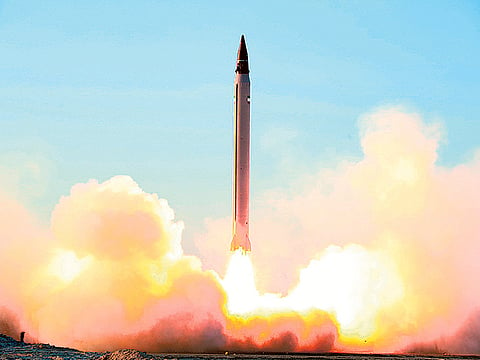Saudi Arabia: World must prevent Iran from developing missile programme
It has managed to acquire the largest mid-east missile force

Abu Dhabi: Saudi Arabia’s representative to the United Nations institutions in Vienna, Prince Abdullah bin Khalid bin Sultan Al Saud, expressed the Kingdom’s conviction of the need to expand the nuclear agreement with Iran.
In an interview with the American CNN network, he indicated that Saudi Arabia cautiously supported the agreement concluded between Tehran and the 5 + 1 group in 2015, and found it has many flaws.
Prince Abdullah continued, “We are convinced of the necessity to reach a new comprehensive agreement that includes regional players and deals with Iran’s ballistic missile programme and terrorist financing, as these matters are very important.”
He explained that Saudi Arabia seeks to prevent Iran from continuing to develop its ballistic missile programme, and to fund armed militias and proxy forces in the region, while stopping its regional activities. He accused high-ranking Iranian officials of blackmailing the board of governors of the International Atomic Energy Agency, through threats to abandon Tehran’s obligations under the nuclear deal.
The Iranians see their missile force as an integral and indispensable part of their national defense strategy, fulfilling key strike roles traditionally taken by manned aircraft, but beyond the capabilities of an Iranian air force hobbled by many years of sanctions.
The missile programme serves key Iranian goals: deterring attacks against Iran, providing warfighting capabilities if deterrence fails or Iran decides to initiate hostilities, supporting military capabilities of regional proxies such as Hezbollah and the Al Houthis, enhancing national pride and regional influence, and providing a nuclear delivery hedge if Iran decides to acquire nuclear weapons.
Ballistic missiles
The use of Iranian ballistic missiles is not just theoretical. Iran has fired ballistic missiles against Iraq during the Iraq-Iran war and against various non-state actor adversaries in neighboring states in recent years. Moreover, Iranian proxies have fired Iranian-supplied missiles and rockets at middle eastern countries, including Israel and Saudi Arabia.
Prince Abdullah expressed Saudi Arabia’s hope that there would be sufficient support within the US Congress, to ensure that any new negotiations with Iran would be broader than it was previously, and said: “The entire international community should take this matter seriously. Of course, we have more risks in the region, but Iran has proven to be untrustworthy.”
He stressed that the Tehran government used the financial gains it achieved thanks to the nuclear deal to “fuel unrest in the region” instead of allocating it to the prosperity of the Iranian people.
Prince Abdullah added, “These matters are extremely worrying and pave the way for its possession of nuclear weapons. We must stop here and ask: How long will we continue to give Iran the benefit of the doubt?”
For decades, the United States has sought to constrain Iran’s missile programme, both because it poses a conventional military threat to regional stability and because it can provide a delivery capability for nuclear weapons should Iran acquire them.
But despite the efforts of the United States and others to impede Iranian procurement of missile-related materials, equipment, and technology and a succession of UN Security Council (UNSC) restrictions imposed largely to prevent Iran from acquiring nuclear weapons delivery systems, Iran has managed to acquire the largest and most diverse missile force in the Middle East.
Iranian missile threat
Iran maintains a force of hundreds of liquid- and solid-propellant short- and medium-range ballistic missiles (SRBMs and MRBMs), now being augmented by land-attack cruise missiles.
Although claiming to limit itself to ballistic missiles with a 2,000 km range by order of the supreme leader and not yet launching ballistic missiles above that range, Iran pursues at least four paths that it could use to develop intercontinental ballistic missiles (ICBMs).









